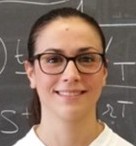 |
VERONICA GUIDETTI
Assegnista di ricerca
Dipartimento di Scienze Fisiche, Informatiche e Matematiche sede ex-Matematica
Docente a contratto
Dipartimento di Scienze Fisiche, Informatiche e Matematiche sede ex-Matematica
|
Home |
Curriculum(pdf) |
Didattica |
Pubblicazioni
2023
- Automated Knowledge Graph Completion for Natural Language Understanding: Known Paths and Future Directions
[Relazione in Atti di Convegno]
Buzzega, G.; Guidetti, V.; Mandreoli, F.; Mariotti, L.; Belli, A.; Lombardi, P.
abstract
Knowledge Graphs (KGs) are large collections of structured data that can model real world knowledge and are important assets for the companies that employ them. KGs are usually constructed iteratively and often show a sparse structure. Also, as knowledge evolves, KGs must be updated and completed. Many automatic methods for KG Completion (KGC) have been proposed in the literature to reduce the costs associated with manual maintenance. Motivated by an industrial case study aiming to enrich a KG specifically designed for Natural Language Understanding tasks, this paper presents an overview of classical and modern deep learning completion methods. In particular, we delve into Large Language Models (LLMs), which are the most promising deep learning architectures. We show that their applications to KGC are affected by several shortcomings, namely they neglect the structure of KG and treat KGC as a classification problem. Such limitations, together with the brittleness of the LLMs themselves, stress the need to create KGC solutions at the interface between symbolic and neural approaches and lead to the way ahead for future research in intelligible corpus-based KGC.
2023
- Death After Liver Transplantation: Mining Interpretable Risk Factors for Survival Prediction
[Relazione in Atti di Convegno]
Guidetti, V.; Dolci, G.; Franceschini, E.; Bacca, E.; Burastero, G. J.; Ferrari, D.; Serra, V.; Di Benedetto, F.; Mussini, C.; Mandreoli, F.
abstract
This study introduces a novel approach to mine risk factors for short-term death after liver transplantation (LT). The method outputs intelligible survival models by combining Cox's regression with a genetic programming technique known as multi-objective symbolic regression (MOSR). We consider 485 Electronic Health Records (EHRs) of patients who underwent LT, containing information on hospitalization and preoperative conditions, with a focus on infections and colonizations by multi-resistant Gram-negative bacteria. We evaluate MOSR outcomes against several performance metrics and demonstrate that they are well-calibrated, predictive, safe, and parsimonious. Finally, we select the most promising post-LT early survival risk score based on information criteria, performance, and out-of-distribution safety. Validating this technique at a multicenter level could improve service pipeline logistics through a trustworthy machine-learning method.
2022
- Real-world data mining meets clinical practice: Research challenges and perspective
[Articolo su rivista]
Mandreoli, Federica; Ferrari, Davide; Guidetti, Veronica; Motta, Federico; Missier, Paolo
abstract
As Big Data Analysis meets healthcare applications, domain-specific challenges and opportunities materialize in all aspects of data science. Advanced statistical methods and Artificial Intelligence (AI) on Electronic Health Records (EHRs) are used both for knowledge discovery purposes and clinical decision support. Such techniques enable the emerging Predictive, Preventative, Personalized, and Participatory Medicine (P4M) paradigm. Working with the Infectious Disease Clinic of the University Hospital of Modena, Italy, we have developed a range of Data-Driven (DD) approaches to solve critical clinical applications using statistics, Machine Learning (ML) and Big Data Analytics on real-world EHRs. Here, we describe our perspective on the challenges we encountered. Some are connected to medical data and their sparse, scarce, and unbalanced nature. Others are bound to the application environment, as medical AI tools can affect people's health and life. For each of these problems, we report some available techniques to tackle them, present examples drawn from our experience, and propose which approaches, in our opinion, could lead to successful real-world, end-to-end implementations.
DESY report number: DESY-22-153.